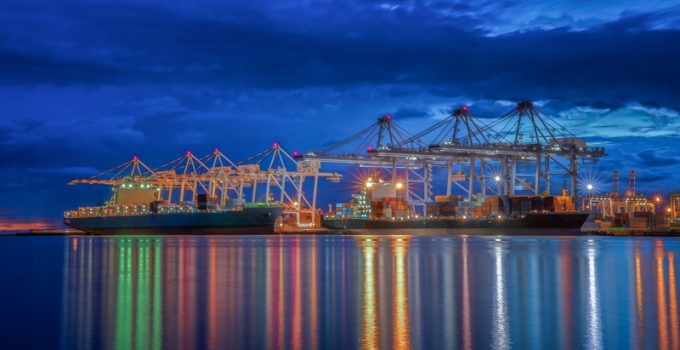WSC appoints Soren Toft and Randy Chen as new chair and vice chair
MSC boss Soren Toft and Randy Chen, vice chairman of Wan Hai, have become chair ...
FDX: ABOUT USPS PRIVATISATIONFDX: CCO VIEWFDX: LOWER GUIDANCE FDX: DISRUPTING AIR FREIGHTFDX: FOCUS ON KEY VERTICALFDX: LTL OUTLOOKGXO: NEW LOW LINE: NEW LOW FDX: INDUSTRIAL WOESFDX: HEALTH CHECKFDX: TRADING UPDATEWMT: GREEN WOESFDX: FREIGHT BREAK-UPFDX: WAITING FOR THE SPINHON: BREAK-UP ALLUREDSV: BREACHING SUPPORTVW: BOLT-ON DEALAMZN: TOP PICK
FDX: ABOUT USPS PRIVATISATIONFDX: CCO VIEWFDX: LOWER GUIDANCE FDX: DISRUPTING AIR FREIGHTFDX: FOCUS ON KEY VERTICALFDX: LTL OUTLOOKGXO: NEW LOW LINE: NEW LOW FDX: INDUSTRIAL WOESFDX: HEALTH CHECKFDX: TRADING UPDATEWMT: GREEN WOESFDX: FREIGHT BREAK-UPFDX: WAITING FOR THE SPINHON: BREAK-UP ALLUREDSV: BREACHING SUPPORTVW: BOLT-ON DEALAMZN: TOP PICK

Singapore, the world’s largest transhipment hub, has emerged as one of the clear winners in the forthcoming alliance reshuffle, new analysis from Alphaliner today shows.
With the February deadline for the new alliance structure to begin – with the three main groupings of the Ocean Alliance, THE Alliance and 2M partnership scheduled to reform into the Gemini Cooperation, Premier Alliance, standalone MSC and an unchanged Ocean Alliance – analysis of the new port rotations shows Singapore gaining six more port calls from the Asia-North Europe carriers.
In the South-east Asia region, Singapore’s gain is partly Maersk-controlled Tanjung Pelepas’s loss, the Malaysian transhipment hub losing two Asia-North Europe calls.
Of the of the main Asian gateway ports, Vietnam’s Cai Mep gains two calls, Yantian loses three, Ningbo loses one and Shanghai’s call number remains the same.
In North Europe, the Belgian hub of Antwerp – MSC’s regional hub – is the main victim of the reshuffle. It will lose four Asia-North Europe calls with the Gemini Cooperation’s exit from the port to focus hub-and-spoke transhipment operations on Rotterdam and Wilhelmshaven.
Across the trade, Rotterdam’s Asia-North Europe call count will remain the same, Hamburg gains one call, Bremerhaven loses one and the French gateway of Le Havre gains a call.
In the UK, the competition between Felixstowe and London Gateway will see the former gain two calls and the latter lose two, while Premier Alliance calls at Southampton will keep its count the same.
Alphaliner reports: “Felixstowe will attract more business at the expense of London Gateway. The Premier Alliance will continue the two weekly calls at Southampton of THE Alliance and no longer use London Gateway.”
For shippers and their freight forwarding partners, the shake-up will prove a net benefit, in terms of choice, the analyst suggests.
“The current five 2M loops, two standalone MSC services and four loops of THE Alliance (11 services in total) will be replaced by four loops each for Gemini, MSC and the Premier Alliance – 12 loops in total,” it writes, adding that the seven loops currently operated by Ocean Alliance members CMA CGM, Cosco, Evergreen and OOCL “are expected to remain largely unchanged”.
However, the total port calls across those 12 services cumulatively offered by Gemini, MSC and Premier Alliance will decline, to 132, compared with the 148 currently offered by 2M and THE Alliance – again due to the Gemini Cooperation’s hub-and-spoke network.
The Gemini network will see its direct port calls drastically reduced, compared with Maersk and Hapag-Lloyd’s current direct call count.
“Interestingly, the four Gemini loops will have a total of 28 port calls, resulting in a low average of only seven calls per loop. MSC’s four standalone services will serve no fewer than 55 ports (14 per loop), which is almost double compared with Gemini.
“It shows the different strategies of the current partners, with Maersk and Hapag-Lloyd going for above-90% schedule reliability, while MSC prefers to offer its clients a multitude of direct services to smaller destinations,” Alphaliner writes.
Comment on this article